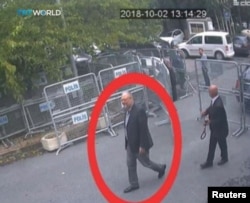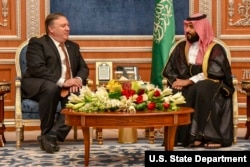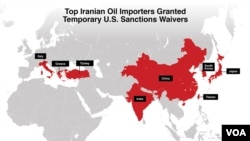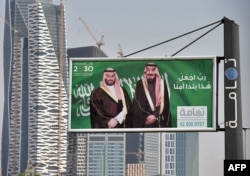A new round of U.S. sanctions targeting Iran's oil and economic sectors went into effect Monday. And analysts say Western capitals are looking at the dynamics of the world oil market as they debate what action, if any, to take against Iran's neighbor, Saudi Arabia, over the recent death of a dissident Saudi journalist.
The West needs the Gulf kingdom to help make up for any oil supply shortfalls caused by the reinstatement of the sanctions against Iran, they say. Even before the penalties were reimposed, a significant amount of oil from the world market was removed, according to Sarah Ladislaw of the Center for Strategic and International Studies, a Washington-based research institution.
“The [Trump] administration has been quick to point out that it is working to ensure oil market stability through liaising with other producing countries and aided by U.S. production growth. All things considered, this may be possible as long as no additional and substantial oil supply disruptions take place, which is far from guaranteed," Ladislaw said.
Self-exiled dissident journalist Jamal Khashoggi was killed last month in Saudi Arabia’s consulate in Istanbul, where he had gone to collect documents allowing him to remarry. His murder by Saudi agents, some of whom have served in the past as bodyguards for Saudi Crown Prince Mohammed bin Salman, was belatedly acknowledged by the Saudi government after leaks to the media by Turkish officials providing details over the incident.
Riyadh first claimed Khashoggi left the consulate alive, but was later forced to acknowledge that the journalist had been killed. Saudi officials have maintained the killing was a rogue operation by renegade security and intelligence officials.
The sanctions are aimed at Iran to “abandon its destructive activities,” according to U.S. Secretary of State Mike Pompeo. But the administration appears to be taking care to keep disruption of the oil markets to the minimum. The United States has granted temporary waivers to eight countries for them to continue to buy Iranian oil.
Saudi Arabia has promised to increase oil production capacity by a million barrels of oil a day to compensate for the loss of Iranian oil. That pledge emphasizes the importance of Saudi Arabia for the West, both in terms of the oil it can supply and its role as an ally in the Gulf, say analysts.
“Like it or not, Saudi Arabia and its partners need one another; they share a long-held interdependency, and the U.S. in particular now considers Riyadh to be an important plank in its effort to push back against Iran,” Neil Quilliam of Britain’s Chatham House wrote in a recent comment.
Quilliam says Western governments need to recalibrate carefully their relationship with Saudi Arabia in the wake of the Khashoggi murder. The analyst adds the West needs to "set terms that place a constraint upon the adventurism of MBS, accompanied by a list of measures they wish to see from the kingdom, aimed at advancing reforms, restoring lost confidence among international investors and helping to stabilize the region." He acknowledges that will be "a tall order."
Michael Stephens of the Royal United Services Institute, a London-based research group, says so far, the Saudi explanations for the Khashoggi killing "do not appear to have been enough to stop Western states mulling options for the imposition of targeted sanctions" on the Gulf kingdom. But among the questions Western governments are asking themselves is, "What will the potential impact on world oil prices be, especially with the U.S. threat to Iran’s oil exports?"
He adds, "Would censuring Riyadh lead to an empowerment of Iran, destabilizing the region further and leading to heightened regional tensions above their currently inflamed levels?"
The consequences of the sanctions on Iranian oil exporters are complicated enough to calculate, with or without Saudi production assistance, says Sarah Ladislaw.
Ladislaw argues the granting of waivers to eight countries "takes pressure off the near-term oil price." But, she says, "Uncertainty still exists over how much of Iran’s remaining approximately 1.5 million barrels per day in crude and condensate exports will come off the market both next week and over the long run." Ladislaw noted this was in part due to what she called "lack of clear guidance from the United States regarding sanctions implementation now and going forward."
Secretary Pompeo and other U.S. officials have avoided setting a deadline for the waivers or indicating when a full ban on Iranian oil exports would take effect. They say that the new sanctions, along with others imposed earlier this year as a consequence of Washington’s withdrawal from an international nuclear deal with Tehran, will undermine the Iranian economy. U.S. President Donald Trump abandoned the nuclear agreement in May, accusing Iran of violating the deal. The Islamic Republic has maintained its nuclear program is for peaceful purposes.
Last week, in the run-up to the reimposition of the oil sanctions, U.S. officials exchanged barbs on social media platforms with Iranian counterparts. On Friday, President Trump invoked the TV show Game of Thrones in a tweet displaying a portrait of himself and the words, “Sanctions are coming” — an apparent reference to the show’s catch phrase, “Winter is coming.”








